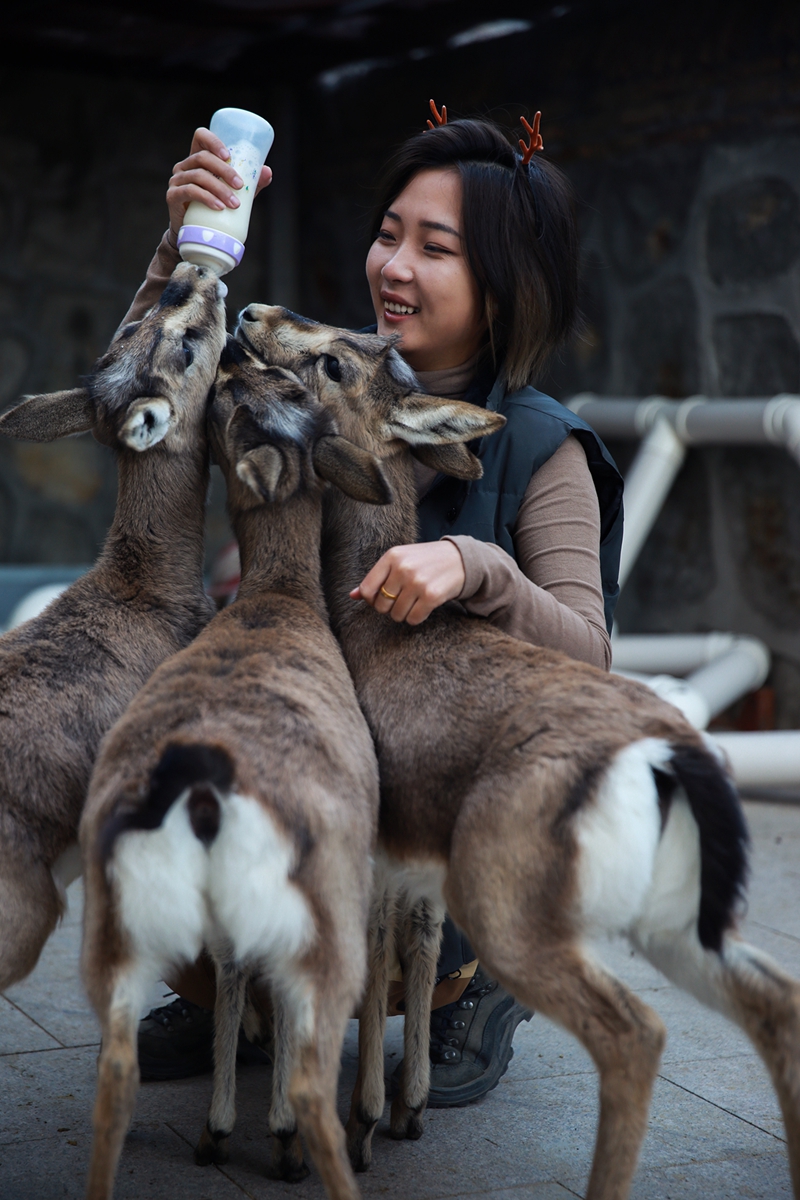
Sino-Mongolian beavers (CHU WENWEN)
Chu Wenwen was only 2 when she started accompanying her father, a conservationist, on his field research tracking wild animals unique to Xinjiang Uygur Autonomous Region, like the Mongolian wild ass and the black-tailed gazelle. Now 28, Chu considers these beautiful creatures part of her family.
After graduating from a Beijing university, she declined job offers in the big city and decided to return home to Altay Prefecture in Xinjiang, and continue work on one of her father's projects—namely the protection of the endangered Sino-Mongolian beaver.
"I want to raise more awareness about wild animals and ecological protection, and engage people to contribute to the cause," Chu told Beijing Review, adding that lending wildlife a helping hand only when necessary is the best way to look after them.
Fauna fun
The Sino-Mongolian beaver is China's one and only beaver species. As of early 2019, 162 families with a total population of 509 lived in the country, and around 900 others existed worldwide—even fewer than the number of giant pandas.
Some three decades ago, Chu's father, who was born in Shandong Province, moved to Xinjiang to study the animal together with his team. Today, she follows in his footsteps and continues the work in Altay, the species' only habitat in China.
These animals have strict territorial requirements and only choose places with sufficient resources to make their nests. Their diet mainly consists of shrubs and willows; they also cut willows to store as winter food and to build dams. Qinghe County in Altay harbors one sanctuary where the Sino-Mongolian beavers can enjoy a life of relative comfort. Unfortunately, the reserve isn't big enough to take in the entire population. Outside its perimeters, most colonies find themselves reproductively challenged due to the limitations of ecosystem. "Sheep and cattle are a big threat to shrubs, and consequently beaver families. But you can't blame them because their owners, the local residents, are native to the area, and usually live by the river, just like the beavers," Chu said.
To strike a balance and warrant a sustainable existence for the beavers, herdsmen and livestock alike, Chu and her colleagues from the nature conservation association she founded in 2018 have been calling on the local community to make an effort through charity programs.
The nongovernmental organization (NGO) initiated a project called Guardians of the Sino-Mongolian Beavers. By donating 500 yuan ($74) each year, one can "adopt" a family of beavers. The money is used to purchase a truck-load of hay for the herdsmen's livestock, thus reducing shrub damage. Speaking of local herders, around 200 of them have thus far been trained to serve as conservation patrol volunteers.
Another project, called Beaver Canteen, got underway in 2018, planting 410,000 willow saplings by the river in Qinghe courtesy of donations from fans nationwide. "That year in Altay, the cost of a bottle of Coca-Cola could cover the planting of one tree, a cup of coffee, six trees, and a serving of fried chicken, 10 trees. Many netizens saved up their loose change to plant saplings for the beavers," Chu shared her experience at the 15th Meeting of the Conference of the Parties to the UN Convention on Biological Diversity held in Kunming, Yunnan Province, in 2021. "Through concerted efforts, the number of nests increased from 162 to 190 over the past four years. That marks a 20-percent jump in the species' overall population," Chu said.
With the combined energies of the local government and Chu's organization, a wildlife rescue center will open in the Altai Mountains in July. This is the first professional station to be established in the rugged region; its predecessor was a small posting that helped over 100 creatures, including beavers, one brown bear and a fox.

Chu Wenwen feeds deer in Altay Prefecture, Xinjiang Uygur Autonomous Region (COURTESY PHOTO)
Idols in the wild
Chu and her NGO want to engage more people and more organizations in their wild animal protection endeavor. They took to social media and began posting short videos starring the beavers in 2019 to show people across China how these animals spend their time in the wild. On Bilibili, a leading video-sharing platform, Chu's account has 185,000 followers.
And some of these fans even became volunteers helping to track, trace and document the animals' every move, and deciding which family member to zoom in on for the short videos.
Chu described her protégés as magical creatures. They build dams so that algae can grow; fish can feed on the algae, and other wild animals can live off the fish. "This creates a virtuous circle," she said.
She added that documenting them can help quantify how many beavers one donor can directly or indirectly help, and create scientific research data.
Because of Chu's short videos and live-streams, some beavers have even become influencers in their own right. "Idolizing them is a way to connect with more young people and garner the 'power of fandoms' to improve the animals' lives," Chu said.
For example, fans of celebrities such as Wang Junkai, a Chinese singer and actor with over 80 million followers on Weibo, China's Twitter equivalent, donated 2,000 trees under the Beaver Canteen program in 2019.
One particularly beloved "idol" was Little Moon. Videos of him eating crunchy carrots while burping gained a large following. Some parents had said that Little Moon's "mukbang" videos even got their children to eat their carrots.
Little Moon's wellbeing was closely monitored by the NGO and overseen on site by a local resident for years. But one day it got injured while vying with others for habitat privileges, and 23 days after being rescued, the idol sadly passed way.
"Perhaps if we had done something earlier, its fate would have been different," Chu said. "But, living a free life in the wild is how they're supposed to spend their days and enabling them to do so is the purpose of protectors like us."
"I'm just happy to see more young Chinese nationwide motivated to do whatever they can with a love for nature and respect for life. I believe that the future of China's ecological conservation will continue to improve," she concluded.
(Print Edition Title: An Eager Beaver)
















